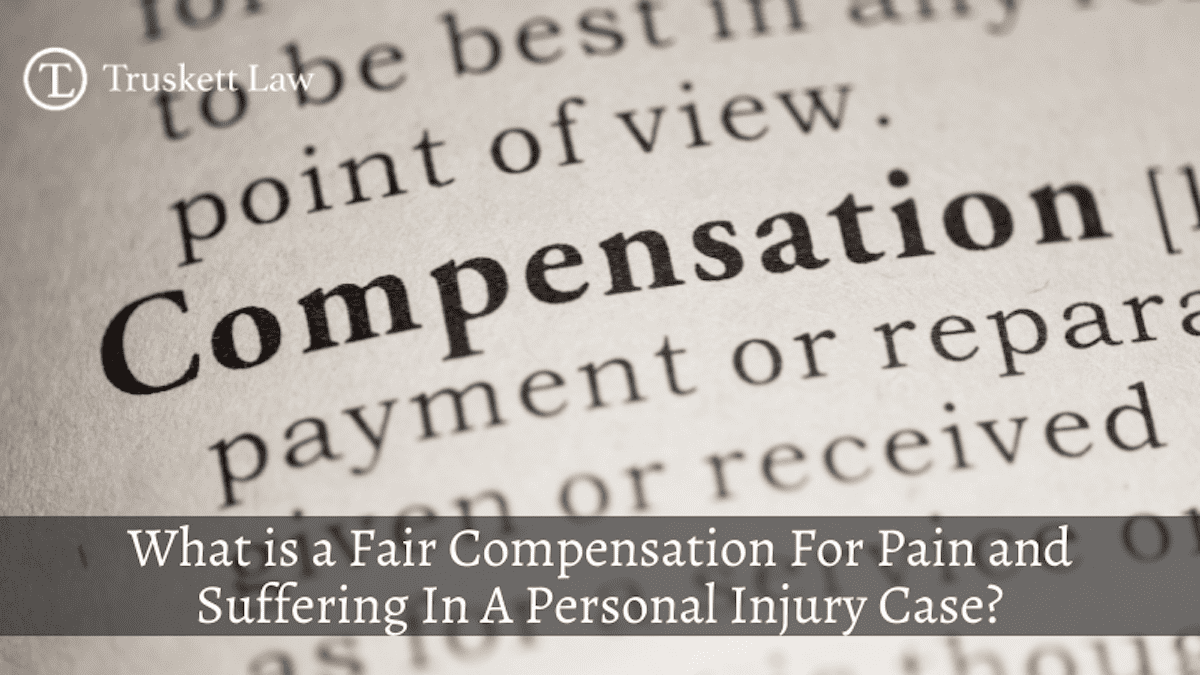
31 Mar What is a Fair Compensation For Pain and Suffering In A Personal Injury Case?
Pain & Suffering Compensation in Personal Injury Case
When you are injured in an accident, you may be entitled to compensation for your pain and suffering. This is a common type of damages award in personal injury cases.
But, what is fair compensation for pain and suffering in a personal injury case? There is no easy or simple answer to this question. Every case is different, and the amount of compensation that a victim receives for pain and suffering will vary depending on the facts and circumstances of the case. However, there are some factors that courts will typically consider when determining a fair amount to award for pain and suffering.
Some of the things that courts may take into account include the severity of the injury, the duration of the pain and suffering, the medical expenses incurred as a result of the injury, and the impact that the injury has had on the victim’s life.
If you have been injured in an accident, you should speak to an experienced personal injury lawyer to learn more about your rights and what you may be entitled to receive for your pain and suffering.
Maximizing Your Personal Injury Compensation
 An experienced lawyer can help you understand the law and maximize your compensation.
An experienced lawyer can help you understand the law and maximize your compensation.
The value of pain and suffering damages varies depending on the individual case. Some factors that may contribute to the amount awarded include the severity of the injury, how long it will take for the person to recover, and any permanent disabilities that are suffered.
In general, though, fair compensation for pain and suffering in a personal injury case may range from several thousand dollars to several million dollars. It is important to speak with an experienced personal injury lawyer to get a better understanding of what you may be entitled to.
Severity of Injury
One factor that is considered when calculating pain and suffering damages is the severity of the injury. The more serious the injury, the higher the number of damages that will be awarded. In addition, the duration of the pain and suffering is also taken into account.
If the injuries are expected to last for a long period, then the damages will likely be higher than if they are expected to heal within a short period.
Ability to Work or Not Work
Another factor that is considered is the victim’s ability to work. If the victim has been left unable to work due to the injuries, then this will also be taken into account when determining damages.
Finally, the defendant’s conduct is also considered. If the defendant was negligent or at fault for the accident, then this will likely increase the number of damages that are awarded.
As you can see, several factors are considered when determining pain and suffering damages. It is important to keep in mind that these amounts can vary significantly from case to case. If you have been injured in an accident, it is important to speak to an attorney who can help you understand how much you may be entitled to receive.
Process of A Pain & Suffering Claim
 The process of claiming pain and suffering can be a long and stressful one.
The process of claiming pain and suffering can be a long and stressful one.
There are many things to consider when making a claim, such as the severity of your injuries, the impact they have had on your life, and what type of compensation you are entitled to.
It is important to seek legal advice from a personal injury lawyer before making any decisions, as they will be able to assess your case and advise you on the best course of action.
If you have been injured in an accident that was not your fault, you may be able to claim compensation for pain and suffering. This is a type of damage that can be awarded to victims of accidents who have experienced physical or psychological pain and suffering as a result of their injuries.
The amount of compensation you may be entitled to will depend on the severity of your injuries, the impact they have had on your life, and the type of accident you were involved in.
If you are claiming pain and suffering, it is important to keep all medical records and receipts relating to your injuries. You will also need to provide evidence of the impact your injuries have had on your life, such as lost earnings, medical expenses, and any other out-of-pocket expenses.
It is important to seek legal advice from a personal injury lawyer before making any decisions, as they will be able to assess your case and advise you on the best course of action.
Compensation for Personal Injury
The amount of compensation you can receive for a personal injury will vary depending on the severity of your injuries, the circumstances surrounding your accident, and other factors.
In general, however, you may be eligible to receive damages for your medical expenses, lost wages, pain, and suffering, and more. If you have been seriously injured in an accident, you should speak with an experienced personal injury attorney to discuss your legal options and ensure that you receive the full compensation you are entitled to.
What Is Pain and Suffering?
 When someone is injured in an accident, they may be entitled to compensation for their pain and suffering.
When someone is injured in an accident, they may be entitled to compensation for their pain and suffering.
This is a fairly complex area of personal injury law, and there are many factors that lawyers will take into account when determining how much pain and suffering compensation to seek.
Some of the things that lawyers will consider include:
The severity of the injury, how long the injury is likely to last, whether there is permanent damage and whether the victim has had to undergo surgery or other medical treatment.
Lawyers will also consider how the injury has affected the victim’s quality of life, including their ability to work, enjoy hobbies, and interact with friends and family.
In some cases, it may be possible to quantify the pain and suffering using a formula that takes into account the severity of the injury and other factors. However, in many cases, it is more difficult to place a monetary value on pain and suffering, and lawyers will often use their experience and knowledge to come up with a figure that they believe is fair compensation.
What to Remember Regarding Pain & Suffering in a Personal Injury Claim
- If you have been injured in an accident, you may be able to file a personal injury claim to recover damages. In addition to medical expenses and lost wages, you may also be able to recover compensation for pain and suffering.
- It can be difficult to quantify pain and suffering damages. This is because there is no set formula for calculating these damages. Instead, the number of damages will depend on several factors, including the severity of your injuries, the length of your recovery, and the impact that the injuries have on your life.
- You may need to prove that the other party was at fault for your injuries to recover pain and suffering damages. This can be done by showing that the other party was negligent or reckless. For example, if you were injured in a car accident, you would need to show that the other driver was at fault for the accident.
- You may need to file a personal injury claim within a certain time frame to recover damages. In most cases, you will need to file your claim within two years of the date of the accident. However, there are some exceptions to this rule. If you have been injured in a car accident, for example, you have three years to file a claim.
- You should keep in mind that pain and suffering damages are not always recoverable. In some cases, the other party may not be liable for your injuries. For example, if you were injured in an accident that was caused by your negligence, you will not be able to recover pain and suffering damages from the other party.
- Keep in mind that pain and suffering damages are not always awarded in personal injury cases. The court will consider many factors when deciding whether to award these damages, and the number of damages may be limited. As such, it is important to speak with an attorney to determine whether you may be able to recover pain and suffering damages in your case.
In conclusion, I trust this article has informed you what a fair compensation is for a personal injury, but as stated each situation and case is uniquely different. If you have further questions about your personal injury case, please contact our team today!


Sorry, the comment form is closed at this time.